Exploring the CCNA Score Report: What's Behind the Numbers?

While I was gathering data for the previous article in the Exploring CCNA series, I saw many people share their successful experiences online, and they also offered their scores at the same time, so the majority of the results were passed reports. However, there were a few brave people who shared their failure experiences as well. Cisco no longer provides a passing score and instead only gives you a percentage of each topic to tell you how well you did. Even though the score report includes a pass or fail status, it can still be a little confusing, especially if you, unfortunately, failed the exam and then found someone's score may look like yours, or even worse than yours, but they passed yet, which is very frustrating! What does the score report mean? How should I prepare for the next exam? To answer these questions, I decided to find out the performance and patterns behind these numbers through data analysis.
Calculate Weighted Score
I extracted score numbers from the gathered posts, such as:
Network Fundamentals:85% Network Access:80% IP Connectivity:96% IP Services:70% Security Fundamentals:40% Automation and Programmability:80%Every topic has a percentage from the data above, but it only represents the topic's performance and cannot show the overall performance of the CCNA exam. We can weight the scores according to the weight of each topic in CCNA's blueprint and then calculate an overall score. like this:
Finally we can get the following data:
| Network Fundamentals | Network Access | IP Connectivity | IP Services | Security Fundamentals | Automation and Programmability | Weighted Score | Exam Result |
|---|---|---|---|---|---|---|---|
| 90% | 85% | 96% | 70% | 73% | 100% | 87% | PASS |
| 95% | 95% | 88% | 80% | 87% | 90% | 90% | PASS |
| 75% | 60% | 64% | 70% | 60% | 80% | 67% | PASS |
| 45% | 55% | 36% | 50% | 27% | 40% | 42% | FAIL |
| 85% | 80% | 96% | 70% | 40% | 80% | 78% | PASS |
| ... | ... | ... | ... | ... | ... | ... | ... |
Next, I will use several statistical methods to analyze these data and will be looking at the following:
- How does each exam topic perform among all candidates?
- Do the candidates on average score significantly better at a certain exam topic?
- Are there any significant relationships between performance on exam topics and final weighted scores?
- What are the significant differences between failed exam scores and passed exam scores on each exam topic?
Topic Performance Distribution
I create these histograms for each exam topic to visualize the distribution of scores, including passed and failed reports. These histograms will help us understand the spread of scores and the differences between passed and failed scores.
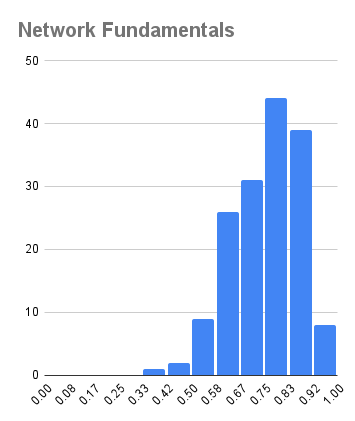
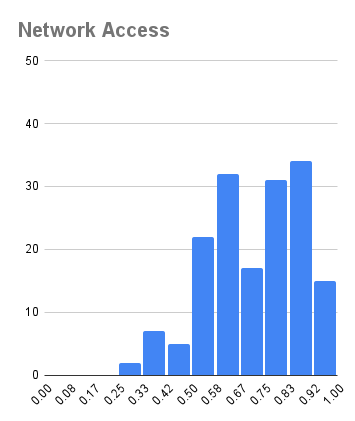
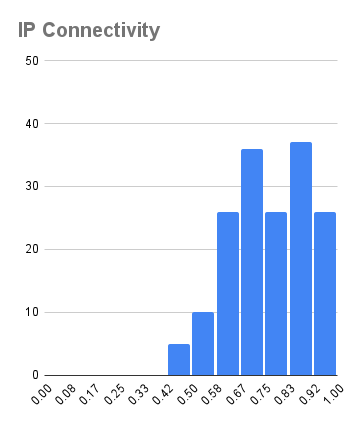

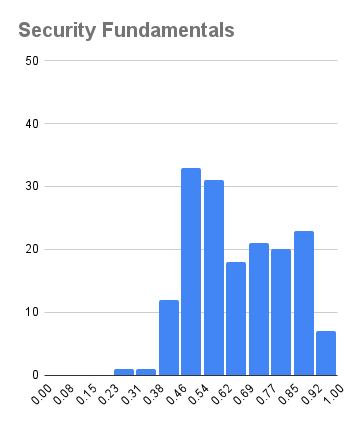
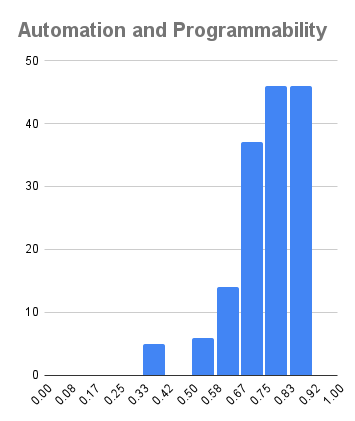
Most of the passed scores distribution are negative skew(left-skewed), and we can see that all the candidates who have passed the exam have a good performance on almost every exam topic, especially IP Services and Automation and Programmability. But we can also see that the candidates' scores on the Security Fundamentals topic were significantly lower than others.
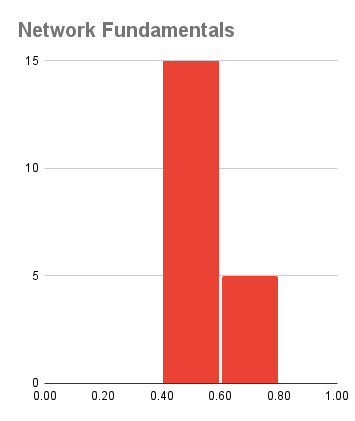
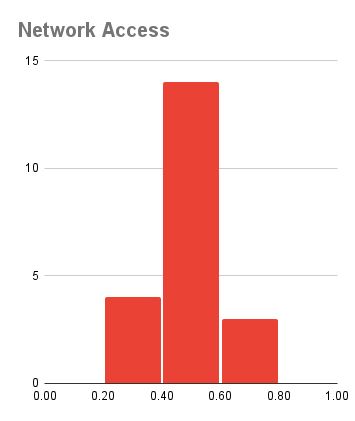
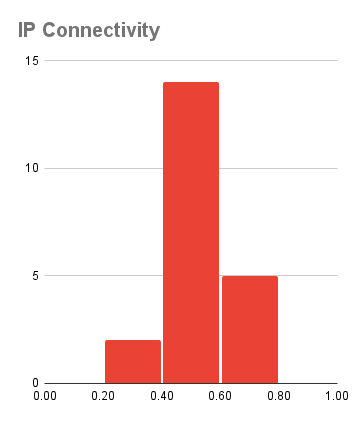
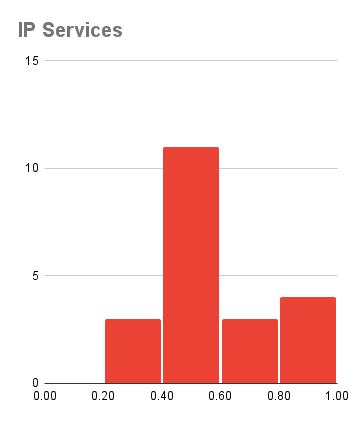
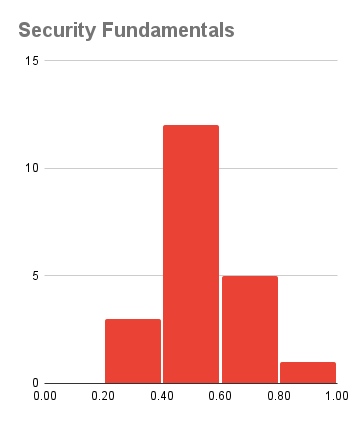

Most of the candidates who failed the exam got scores between 40% and 60% on every exam topic. Then, let's compare the distribution of the weighted scores.

We can see that the approximate "passing mark" of CCNA is around 62%. Above this score, there is no failure. On the other hand, it is worth noting that the weighted score is not the same as the real score. The data in the figure above illustrates this problem well: the weighted scores of a small number of people who passed the exam are even lower than those who failed the exam!
Topic Average Scores
To find the best or worst performance on the exam topic, we calculate the average and median scores for each exam topic among passed and failed reports separately.
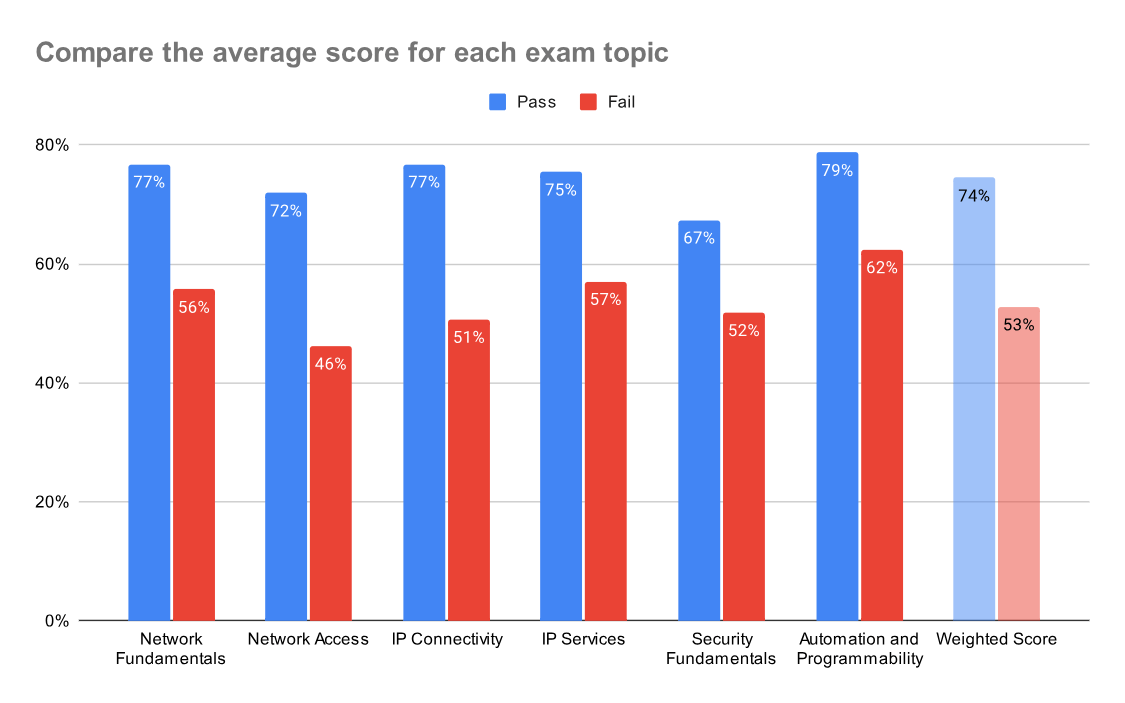
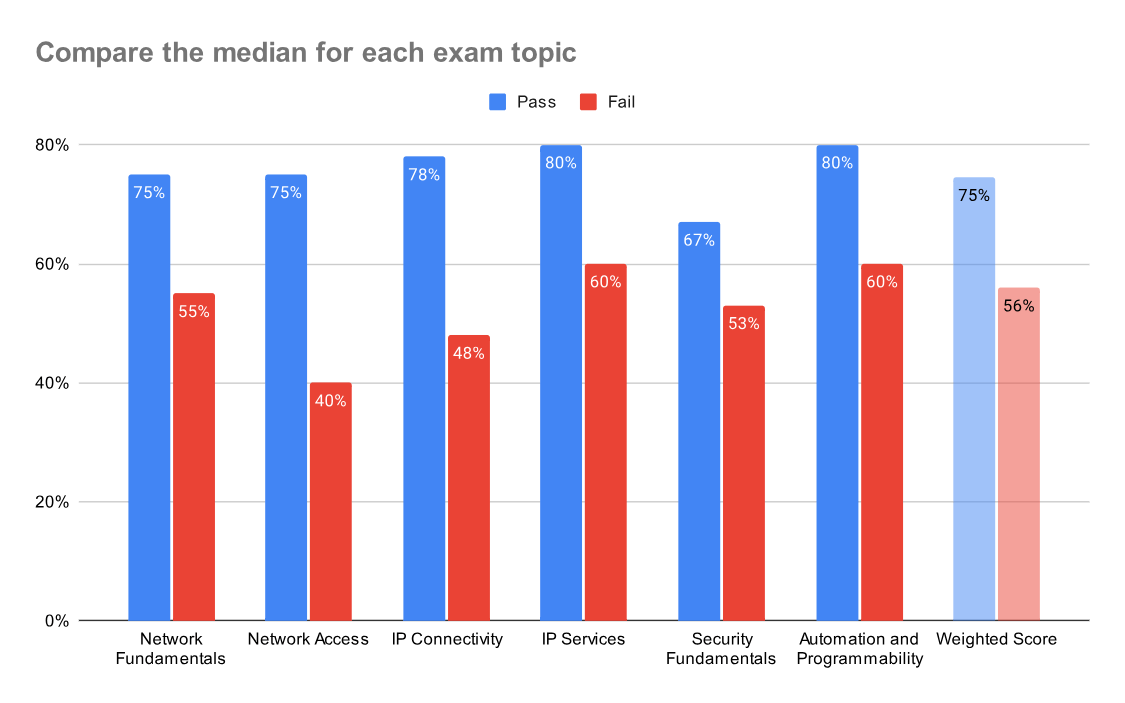
We can see again that Automation and Programmability has the best performance in both passed and failed reports! IP Services also did well. Security Fundamentals has the worst performance in passed reports, and Network Access has the worst performance in failed reports.
Correlation Analysis of Weighted Score
Plot scatter to show the relation between each topic with Weighted Score, Y-axis is Topic Score, X-axis is Weighted Score:
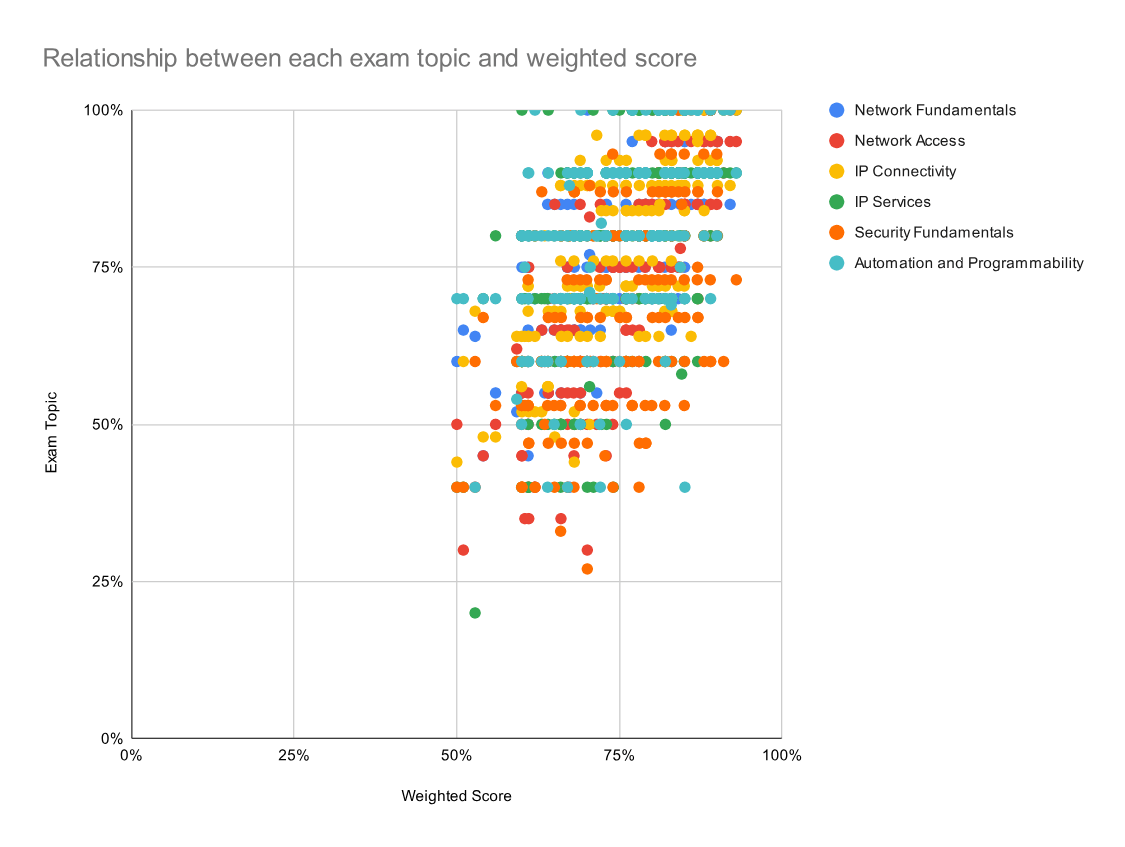
Based on the scatter plot above, we can see that most exam topics have a positive linear correlation, which means the candidate who gets a high weighted score is likely to get a high score in others, and vice versa.
Next, we take a look at their correlation coefficients:
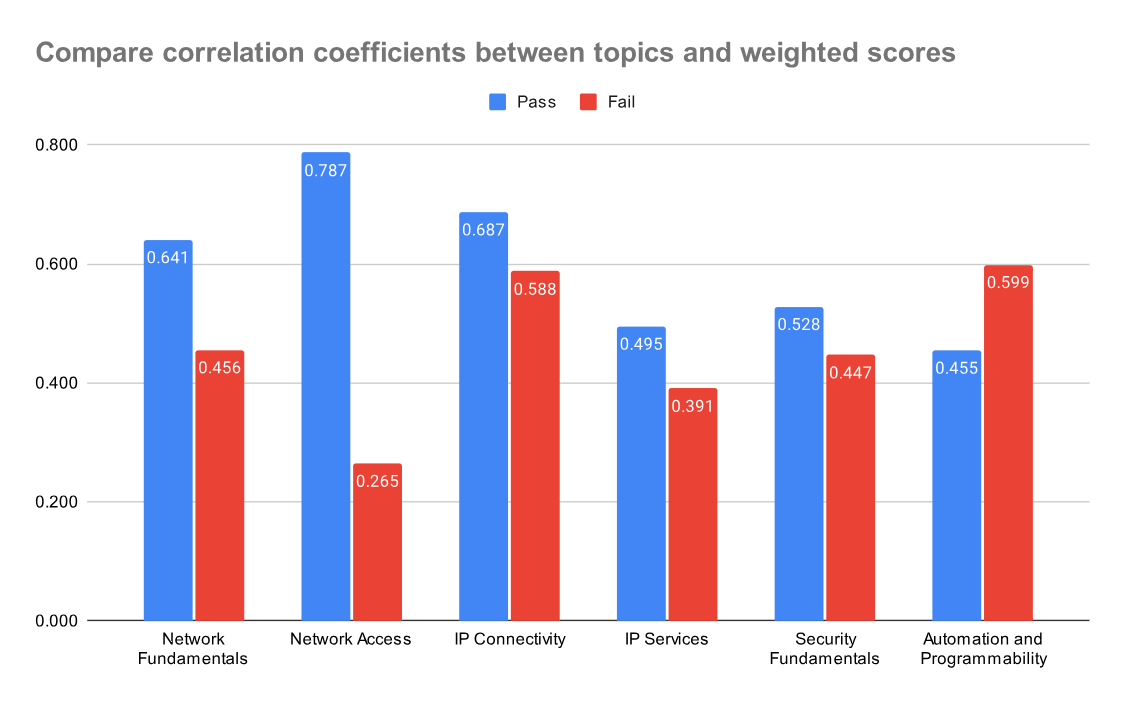
According to the CCNA blueprint, although IP Connectivity has the maximum weight (25%), but it does not have the highest correlation coefficient. Network Access is the highest among the topics that passed the exam, and Automation and Programmability is the highest among the topics that failed the exam. Interestingly, they are also vice versa, respectively is the lowest in the opposite case.
The Differences Between Passed and Failed Scores
This is a question that I am personally more interested in because CISCO will never tell you which questions you answered correctly and which ones you answered incorrectly. So if I unfortunately fail the exam, how can I improve my score? I compare the data of passed and failed reports using a Box plot:
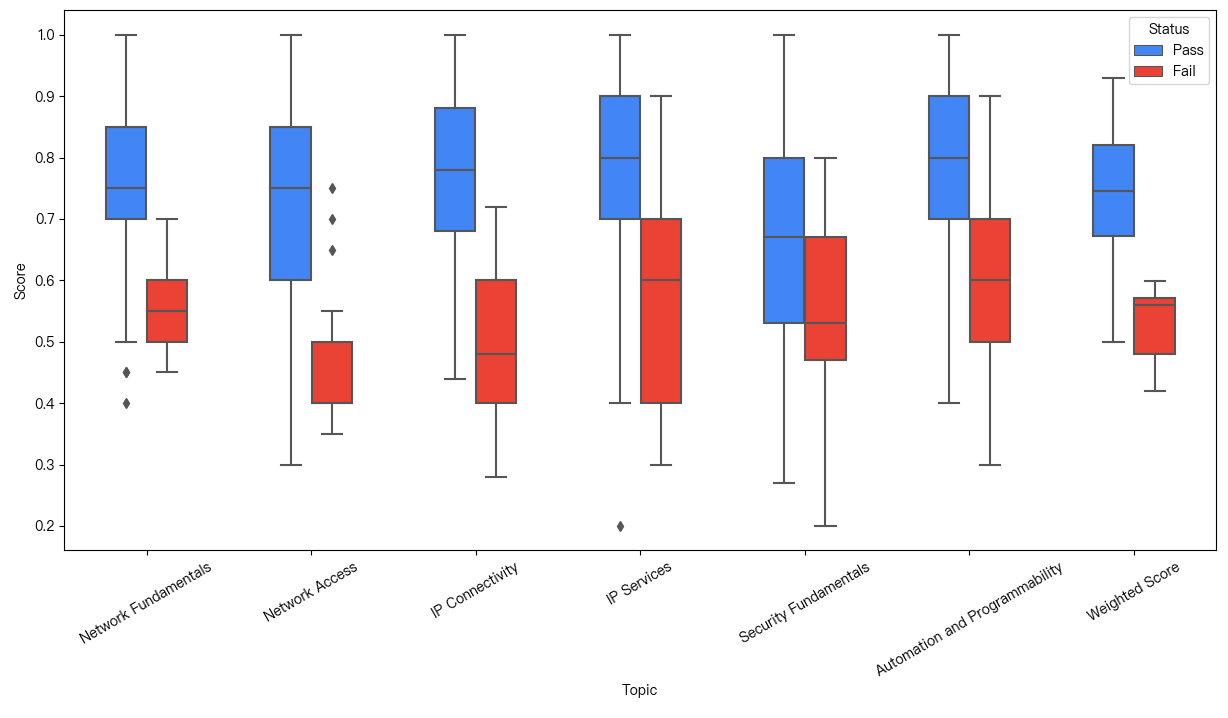
A box plot contains the minimum, first quartile, median, third quartile, and maximum from bottom to top. The height of the box indicates the concentration and variance of the data. Overall, the variance of exam topics that passed the exam is larger than that of those that failed the exam, and the data spread is wider. By comparing the box height of exam topics that passed and failed, we found that candidates who passed the exam performed significantly better than those who did not, on Network Fundamentals, Network Access, and IP Connectivity, indicating that they had a significant advantage in these topics. On the other hand, candidates who failed had the worst performance on Network Access, with the lowest median, almost overlapping with the first quartile. However, the difference in Security Fundamentals between the candidates who failed and those who passed was not particularly obvious.
If you fail the exam, you can compare your report with the chart above to see where your scores for each topic are, so you can better plan your study.
Summary
Based on the above data analysis, I can express some personal opinions (not representing objectivity): Automation and Programmability and IP Services may be easier to learn, and all candidates (whether they passed the exam or not) got better performance than other topics. Security Fundamentals is a common weakness, and most people's performance is average. Network Access is definitely worth your attention, as it has a strong correlation with whether you pass the exam or not. Of course, IP Connectivity is also very important, after all, it occupies the largest weight.
Thank you for reading, I hope this will be helpful to your CCNA journey, I wish you the best results!